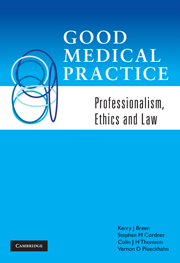Book contents
- Frontmatter
- Foreword
- Contents
- List of tables
- Preface
- Preface to the 1997 edition
- Acknowledgments
- About the authors
- Table of cases
- Table of statutes
- 1 Ethical principles for the medical profession
- 2 Ethical and legal responsibilities of medical students
- 3 Communication skills
- 4 Consent and informed decision making
- 5 Confidentiality, privacy and disclosure
- 6 Medical records, reports and certificates
- 7 Negligence, professional liability and adverse events
- 8 The regulation of the medical profession
- 9 Health care complaints systems
- 10 The doctor and sexual boundaries
- 11 Personal health of the doctor: illness and impairment
- 12 Maintenance of professional competence
- 13 Ethics and the allocation of health-care resources
- 14 The Australian health-care system
- 15 The doctor and interprofessional relationships
- 16 Entering and leaving practice and practice management
- 17 Clinical research
- 18 Prescribing and administering drugs
- 19 Diagnosing and certifying death and the role of the coroner
- 20 Births, reproductive technology, family law and child protection
- 21 Termination of pregnancy and related issues
- 22 Withholding or withdrawing treatment in the seriously or terminally ill
- 23 The law and the mentally ill
- 24 The law and courts of law in Australia
- 25 Medico-legal examinations and reports, court procedures and expert evidence
- 26 Other legislation relevant to medical practice
- APPENDIX 1 AMA CODE OF ETHICS – 2004
- Index
Preface
- Frontmatter
- Foreword
- Contents
- List of tables
- Preface
- Preface to the 1997 edition
- Acknowledgments
- About the authors
- Table of cases
- Table of statutes
- 1 Ethical principles for the medical profession
- 2 Ethical and legal responsibilities of medical students
- 3 Communication skills
- 4 Consent and informed decision making
- 5 Confidentiality, privacy and disclosure
- 6 Medical records, reports and certificates
- 7 Negligence, professional liability and adverse events
- 8 The regulation of the medical profession
- 9 Health care complaints systems
- 10 The doctor and sexual boundaries
- 11 Personal health of the doctor: illness and impairment
- 12 Maintenance of professional competence
- 13 Ethics and the allocation of health-care resources
- 14 The Australian health-care system
- 15 The doctor and interprofessional relationships
- 16 Entering and leaving practice and practice management
- 17 Clinical research
- 18 Prescribing and administering drugs
- 19 Diagnosing and certifying death and the role of the coroner
- 20 Births, reproductive technology, family law and child protection
- 21 Termination of pregnancy and related issues
- 22 Withholding or withdrawing treatment in the seriously or terminally ill
- 23 The law and the mentally ill
- 24 The law and courts of law in Australia
- 25 Medico-legal examinations and reports, court procedures and expert evidence
- 26 Other legislation relevant to medical practice
- APPENDIX 1 AMA CODE OF ETHICS – 2004
- Index
Summary
The primary purpose of this book is to provide in a single accessible format information central to the professional, ethical and legal requirements of being a doctor. It covers a core curriculum for medical students who must obtain a grounding in the elements of what constitutes being a medical professional [1–2]. The same material is essential for doctors in training and for international medical graduates coming to work in Australia. This book should be a useful and readily accessible starting point for busy doctors looking for answers to issues as they arise in practice. This edition brings together updated material generally not found in textbooks of clinical medicine. Although most doctors are now equipped to seek information electronically, this can take time as information is not accessed readily or integrated at a single source, may not be relevant to the local setting and may not be quality controlled.
Since the 1997 edition of our book there have been significant developments in regard to the importance of professionalism. Medical boards here and overseas have focused attention on the breadth of professional skills needed for good medical practice; indeed the UK General Medical Council's primer for doctors is called just that, Good Medical Practice. More recently, medical indemnity organisations and health-care institutions have been active in promoting good professional attitudes and behaviour, under the banner of ‘risk management’, to reduce the risk of adverse outcomes.
- Type
- Chapter
- Information
- Good Medical PracticeProfessionalism, Ethics and Law, pp. xxii - xxivPublisher: Cambridge University PressPrint publication year: 2010
- 1
- Cited by

